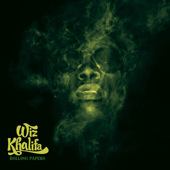
Wiz Khalifa
Rolling Papers
(Atlantic/Rostrum; 2011)
By Colin McGowan | 4 April 2011
Wiz Khalifa, he of marijuana and champagne, commences his major label debut with a number about blowing paper. And the world keeps spinning, right? It would be easy to categorize the Pittsburgh native as an evolutionary step up from Nelly, all melodic flows and distinctive slang and little substance, but waving away Khalifa’s cloak of weed smoke can be a rewarding endeavor. Opener “When I’m Gone” is anthemic and boastful, yet the hook drips of melancholy: “I’m gonna spend it all / Why wait for another day? / I’ma take all this money out / And throw it all away / ‘Cause I can’t take it when I’m gone.” Khalifa repeats “gone” a few more times and it skims across the skittering electronic beat like a single stone. It’s this sadness—some odd brew of fatalism and wistfulness—that renders Khalifa more interesting than many of his weed and swag rap contemporaries.
Rolling Papers walks the line all good pop music does. It is uncomplicated without being one-note, easy to grasp without seeming facile. And that’s what Wiz makes, really: pop music with enough swagger to be called hip-hop. Three of the songs on Rolling Papers are produced by the Swedish production team StarGate, who have crafted tracks for Katy Perry, Beyonce, Ne-Yo,and Rihanna. Khalifa adopts a sing-songy cadence for several of the tracks here, often forsaking the “3 sixteens and a hook” blueprint, and the choruses are frequently of the syrupy ear candy variety. Call it Post-Drake rap, more concerned with melody than verbal gymnastics.
The driving force behind this is Khalifa’s sheer force of personality. Most tracks on Rolling Papers have a single theme—i.e., love, stunting, fame, dying relationships, partying—but Khalifa attacks each with the fervor of a young man experiencing them for the first time. When he’s confident, he borders on delirious (“On My Level”). When he captures the tear-inducing joy of accomplishing one’s aspirations on “Cameras” and even takes time to remark on the surreal nature of his newfound fame, he’s strangely humble, hoping it doesn’t extinguish before his eyes (“Wake Up”). His sentiments are simple: “Used to not be allowed in the building / But now we on the rooftop.” Every syllable smacks of a sincerity that’s downright endearing.
The production he selects is spacious, sometimes airy and sometimes stadium-sized, with huge synth washes escalating alongside his hooks. “No Sleep” is a rollicking piano party jam until it reaches the chorus, which sounds like late-era Blink-182 if Blink-182 had ever figured out how to hone a tone more emotive than “silly” and “pouty.” “Roll Up” unfurls canned horns and multiple sun-drenched Khalifas on the hook. And “Black and Yellow,” well, you know what it is. The only organic sounds on the album are acoustic guitars on “Fly Solo” and “Get Your Shit,” which serve as a reminder that Rolling Papers could do with some sonic variety, but otherwise the electronic sound he so loves bundles the tracks together coherently. Rolling Papers is a unified document in a way few major label rap records are.
I’m parsing, and perhaps Khalifa’s music isn’t built for such meticulous analysis. One’s enjoyment of “Roll Up,” the album’s second single, is dependent on how infectious they find Khalifa’s brand of giggling charisma and the sonic palette he selects. I happen to find that hook downright adorable, but I also find Khalifa ingratiating. His persona is after all understandably polarizing: most rappers sell themselves to the listening public to an extent, but Wiz plasters his goofy visage all the fuck over his music in a way that’s probably plain nauseating to detractors. He’s a Rorschach test in a way few rappers are.
Is “Got money, white people turned neighbors” charming or annoying? Your response indicates whether you will consider Rolling Papers a success or otherwise. And while quibbling over whether Khalifa’s variety of hip-hop is, like, “good” or whatever is welcome, he’s undeniably a master of his style. The pesky hands of A&Rs usually find a way to obscure the distinct voice of young rappers, transforming their records into jagged documents as maturely crafted as a child’s pasta mosaic. On Rolling Papers, Wiz Khalifa’s personality shines through: unobscured, stoned, brilliant.





